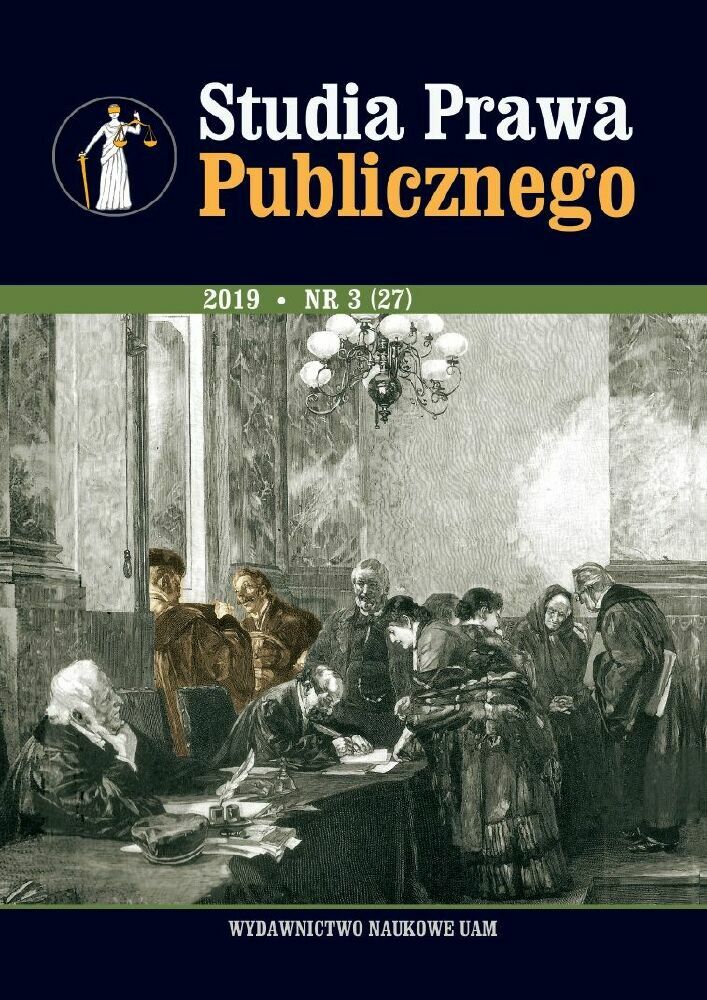Abstrakt
The issue of natural law has been mentioned by almost all philosophers of law, from the classical ones of ancient Greece to contemporary postmodernists, and is presented in various ways. In compliance with Cicero’s observation that “history is the herald of the future” we have attempted to go back to the sources and to start our considerations ab ovo. The historical review does not address systematically the issue discussed here, and only serves to properly explain what natural law in a classical reflection of ius naturale is. Therefore, our approach to the classical natural law has been narrowed down to three selected sophists, Socrates, Plato and Aristotle, and their views of ius naturale in opposition to ius positivum have been briefly outlined. The article consists of two parts: the first one entitled From Heraclitus to Socrates and the second entitled From Plato to Aristotle. The first part presents sophists’ views on the law of nature. It is worth noting that sophists did not analyse the essence of the law of nature; they were primarily interested in the relationship of the law of nature to positive law. Thus Socrates, by deriving the existence of universal and unchanging laws from human nature, gave birth to the doctrine of natural law with unchanging content. The second part contains the views of Plato and Aristotle on the question of the law of nature. Plato is considered to have discovered the ideal trend of natural law, although in his dialogues the term “law of nature” is not found. It was the theory of Plato’s ideas that became the model for the concept of lex aeterna as an arrangement of divine ideas. Whereas, Aristotle distinguished two types of good that law puts before man, and accepts them as the basis for the dichotomous division of laws. He described good that is indifferent to man, which due to specific circumstances becomes the object of his desire, as positive law. Good that is closely related to the nature of man, which is always and everywhere the object of his desire, is good indicating the natural law.
Bibliografia
Arystoteles, Retoryka, tłum. W. Podbielski, Warszawa 1988.
Arystoteles, Polityka, tłum. L. Piotrowicz, Warszawa 2006.
Arystoteles, Etyka nikomachejska, tłum. D. Gromska, Warszawa 2007.
Charmont J., La renaissance du droit naturel, Paryż 1910.
Cycero, Pisma filozoficzne, t. 3, O najwyższym dobru i złu, tłum. W. Kornatowski, Warszawa 1961.
Delhaye Ph., Permanence du droit naturelle, Louvain 1967.
Diogenes Laertios, Żywoty i poglądy słynnych filozofów, tłum. I. Krońska, K. Leśniak, W. Olszewski, B. Kupis, Warszawa 1982.
Działocha K., Gromski W., Niepozytywistyczne koncepcje państwa prawnego a Trybunał Konstytucyjny, ,,Państwo i Prawo” 1995, z. 3.
Dembińska-Siury D., Sokrates, w: Powszechna encyklopedia filozofii, t. IX, pod red. A. Maryniarczyka, Lublin 2009.
Gajda-Krynicka J., Sofiści, w: Powszechna encyklopedia filozofii, t. IX, pod red. A. Maryniarczyka, Lublin 2009.
Hegel G. W. F., Grundlinien der Philosophie des Rechts, Berlin 1820.
Herwada J., Historia prawa naturalnego, tłum. A. Dorabialska, Kraków 2013.
Janet P., Historia doktryn politycznych wraz z historią filozofii prawa, tłum. E. Rutkowska, Poznań 1923.
Jaskólska J., Powody i okoliczności proklamowania Powszechnej Deklaracji Praw Człowieka, ,,Człowiek w Kulturze” 1998, nr 11.
Krąpiec M. A., Człowiek i prawo naturalne, Lublin 1975.
Kozłowski T., Wstęp, w: Platon, Prawa, tłum. M. Maykowska, Warszawa 1997.
Krokiewicz A., Zarys filozofii greckiej. (Od Talesa do Platona), Warszawa 1971.
Kurdziałek M., Dwie starożytne koncepcje sprawiedliwości, ,,Ethos” 1988, nr 2/3.
MacCormick N., Natural Law and the Separation of Law and Moral, w: Natural Law Theory Contemporary Essays, pod red. R.P. George, Oxford 1992.
Martyniak C., Filozofija prawa. Wykłady prof. Czesława Martyniaka, msp., Lublin 1939.
Morawski L., Spór o pojęcie państwa prawnego, ,,Państwo i Prawo” 1994, z. 4.
Morawski L., Główne problemy współczesnej filozofii prawa. Prawo w toku przemian, Warszawa 2003.
Mycielski A, Historia filozofii prawa, Warszawa 1980.
Narecki K., Protagoras z Abdery, w: Powszechna encyklopedia filozofii, t. VIII, pod red. A. Maryniarczyka, Lublin 2007.
J. Oniszczuk, Filozofia i teoria prawa, Warszawa 2008.
Piechowiak M., Do Platona po naukę o prawach człowieka, w: Księga Jubileuszowa Profesora Tadeusza Jasudowicza, pod red. J. Białocerkiewicza, M. Balcerzaka, A. Czeczko-Durlak, Toruń 2004.
Petrażycki L., Die Lehre vom Einkommen, t. 2, Berlin 1895.
Platon, Protagoras, Eutyfron, tłum. S. Siedlecki, Kraków 1881.
Platon, Gorgiasz, tłum. W. Witwicki, Warszawa 1958.
Platon, Państwo, tłum. W. Witwicki, Warszawa 1958.
Platon, Uczta, Eutyfron, Obrona Sokratesa, Kriton, Fedon, tłum W. Witwicki, Warszawa 1984.
Platon, Sofista. Polityk, tłum. W. Witwicki, Kęty 2002.
Platon, Prawa, tłum. D. Zygmuntowicz, Kęty 2017.
Popper K., Społeczeństwo otwarte i jego wrogowie, tłum. M. Krahelska, t. 1, Warszawa 1993.
Strauss L., Prawo naturalne w świetle historii, tłum. T. Górski, Warszawa 1969.
Szadok-Bratuń A., Filozofia prawa w polskiej kulturze uniwersyteckiej dwudziestego stulecia, ,,Orbis Linguarum” 2015, vol. 42.
Tatarkiewicz W., Historia filozofii, t. 1, Warszawa 1970.
Tokarczyk R., Klasycy prawa natury, Lublin 2009.
Tokarczyk R., Historia filozofii prawa w retrospektywie prawa natury, Białystok 1999.
Waśkiewicz H., „Drugie odrodzenie” prawa naturalnego, ,,Roczniki Filozoficzne KUL” 1962, nr 2.
Waśkiewicz H., Historia filozofii prawa. Filozofia prawa starożytnego świata pogańskiego, Lublin 1960.
Zajadło J., Formuła Radbrucha. Filozofia prawa na granicy pozytywizmu prawniczego i prawa natury, Gdańsk 2001.
Zieliński E.I., Platon, w: Powszechna encyklopedia filozofii, t. VIII, pod red. 8, A. Maryniarczyka, Lublin 2007.
Zygmuntowicz D., Prawa Platona – status quaestionis, ,,Archiwum historii filozofii i myśli społecznej” 2008, t. 53.
Licencja
Prawa autorskie (c) 2019 Aleksandra Szadok-Bratuń, Marek Bratuń

Utwór dostępny jest na licencji Creative Commons Uznanie autorstwa – Użycie niekomercyjne – Bez utworów zależnych 4.0 Międzynarodowe.

